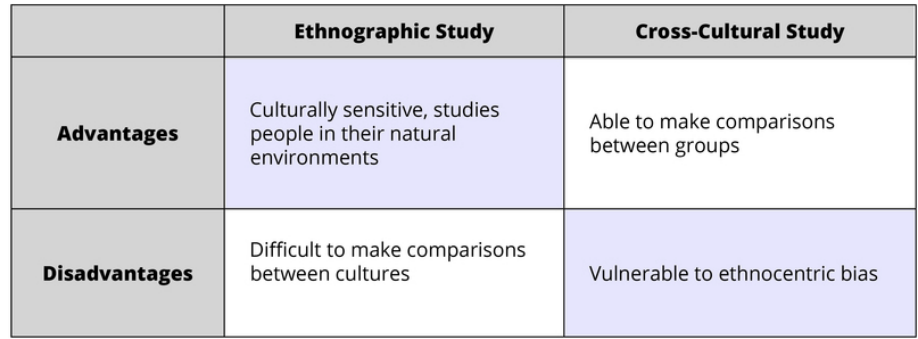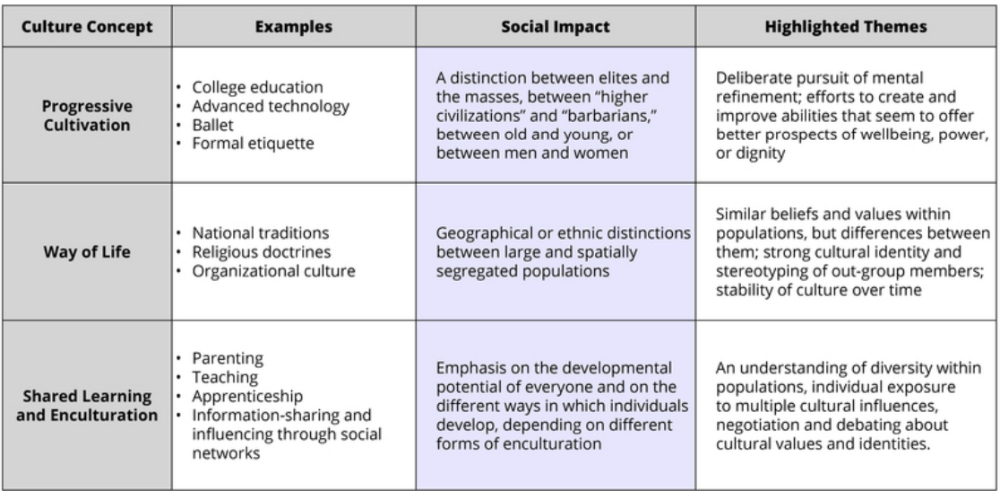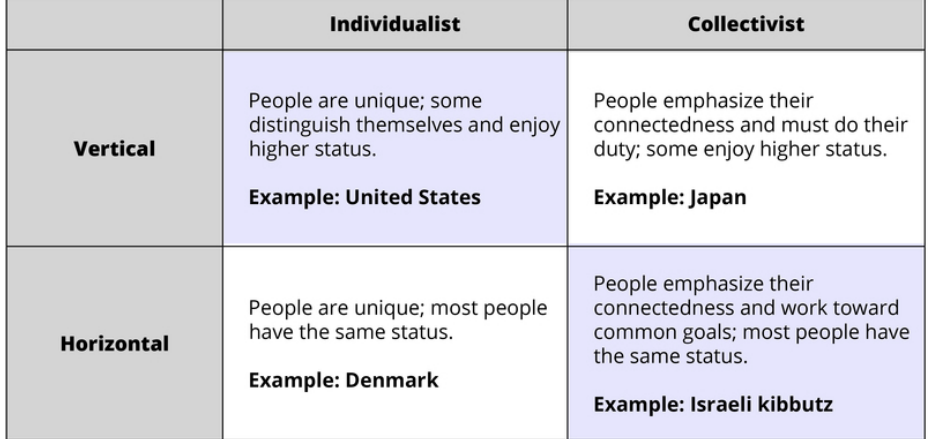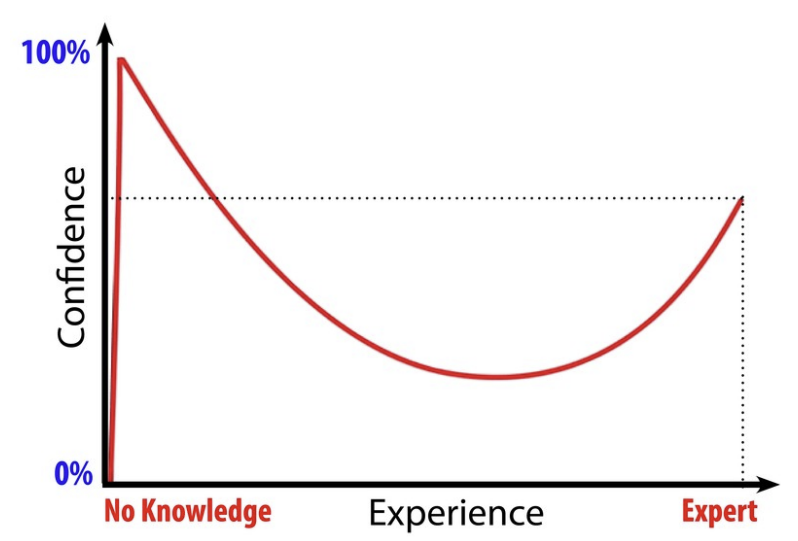advantages and disadvantages of ethnographic study and cross-cultural study.

Culture concepts and their application

Individualist and collectivist cultures

Collectivism
- The cultural trend in which the primary unit of measurement is the group.
- likely to emphasize duty and obligation over personal aspirations
Cross-cultural psychology (or cross-cultural studies)
- An approach to researching culture that emphasizes the use of standard scales
- a means of making meaningful comparisons across group
Cultural differences
- understanding culture primarily by paying attention to unique and distinctive features that set them apart from other cultures.
Cultural intelligence
The ability and willingness to apply cultural awareness to practical uses
Cultural psychology
- An approach to researching culture that emphasizes the use of interviews
- observation as a means of understanding culture from its own point of view.
Cultural relativism
- The principled objection to passing overly culture-bound (i.e., “ethnocentric”) judgements on aspects of other cultures.
Cultural script
- Learned guides for how to behave appropriately in a given social situation.
- reflect cultural norms and widely accepted values.
Cultural similarities
- understanding culture primarily by paying attention to common features that are the same as or similar to those of other cultures
Culture
- A pattern of shared meaning and behavior among a group of people that is passed from one generation to the next.
Enculturation
The uniquely human form of learning that is taught by one generation to another.
Ethnocentric bias (or ethnocentrism)
- Being unduly guided by the beliefs of the culture you’ve grown up in,
- especially when this results in a misunderstanding or disparagement of unfamiliar cultures.
Ethnographic studies
- Research that emphasizes field data collection and that examines questions that attempt to understand culture from it's own context and point of view.
Independent self
- The tendency to define the self in terms of stable traits that guide behavior.
Individualism
- The cultural trend in which the primary unit of measurement is the individual.
- Individualists are likely to emphasize uniqueness and personal aspirations over social duty.
Interdependent self
The tendency to define the self in terms of social contexts that guide behavior.
Observational learning
Learning by observing the behavior of others.
Open ended questions
Research questions that ask participants to answer in their own words
Ritual
- performed in a systematic or prescribed way often for an intended purpose.
- Example: The exchange of wedding rings during a marriage ceremony in many cultures.
Self-construal
The extent to which the self is defined as independent or as relating to others.
Situational identity
- Being guided by different cultural influences in different situations,
- such as home versus workplace, or formal versus informal roles.
Standard scale
- Research method in which all participants use a common scale to respond to questions.
- —typically a Likert scale—
Value judgment
An assessment—based on one’s own preferences and priorities—about the basic “goodness” or “badness” of a concept or practice.
Value-free research
Research that is not influenced by the researchers’ own values, morality, or opinions
The Dunning-Kruger Effect

Counterfactual thinking
Mentally comparing actual events with fantasies of what might have been possible in alternative scenarios.
Downward comparison
Making mental comparisons with people who are perceived to be inferior on the standard of comparison.
Dunning-Kruger Effect
- The tendency for unskilled people to be overconfident in their ability
- highly skilled people to underestimate their ability
Fixed mindset
- The belief that personal qualities such as intelligence are
traits that cannot be developed.
People with fixed mindsets often underperform compared to those with “growth mindsets”
Frog Pond Effect
- The theory that a person’s comparison group can affect their
evaluations of themselves.
Specifically, people tend to have lower self-evaluations when comparing themselves to higher performing groups.
Growth mindset
The belief that personal qualities, such as intelligence, can be developed through effort and practice
Individual differences
Psychological traits, abilities, aptitudes and tendencies that vary from person to person.
Local dominance effect
People are generally more influenced by social comparison when that comparison is personally relevant rather than broad and general.
Mastery goals
- Goals that are focused primarily on learning, competence, and self-development.
- contrasted with “performance goals” that are focused on the quality of a person’s performance.
N-Effect
The finding that increasing the number of competitors generally decreases one’s motivation to compete
Personality
A person’s relatively stable patterns of thought, feeling, and behavior.
Proximity
- The relative closeness or distance from a given comparison standard.
- The further from the standard a person is, the less important he or she considers the standard.
- When a person is closer to the standard he/she is more likely to be competitive.
Self-enhancement effect
- The finding that people can boost their own self-evaluations by comparing themselves to others who rank lower on a particular comparison standard.
Self-esteem
The feeling of confidence in one’s own abilities or worth.
Self-evaluation maintenance (SEM)
- A model of social comparison that emphasizes...
- one’s closeness to the comparison target,
- the relative performance of that target person,
- relevance of the comparison behavior to one’s self-concept.
Social category
- Any group in which membership is defined by similarities between its members.
- Examples include religious, ethnic, and athletic groups.
Social comparison
The process by which people understand their own ability or condition by mentally comparing themselves to others.
Upward comparisons
Making mental comparisons to people who are perceived to be superior on the standard of comparison